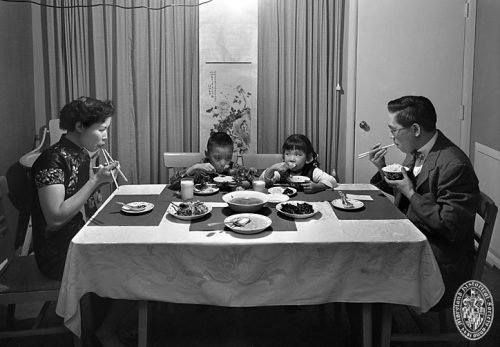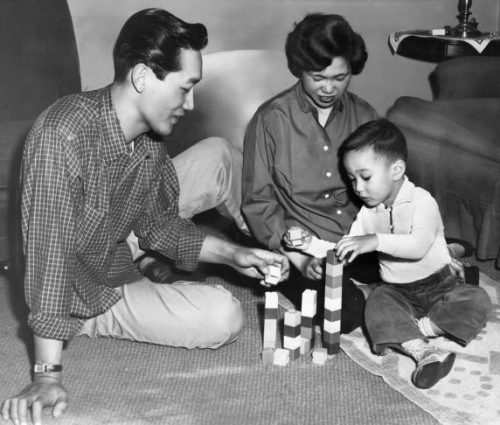We are all damaged
12 May

Unidentified Chinese American Family at Dinner. March, 1958. Photograph by A. Aubrey Bodine.
Rinpoche had been working closely with a few of us on a number of projects. For Rinpoche, a project is not just a job. It is also a means by which Rinpoche is able to work with our internal issues simultaneously. It is obvious that all of us are heavily influenced by our parents during the formative years of our childhood. We continue to relive our childhood over and over again through our behavioural patterns that originated in our childhood.
Some of us have parents that are nasty and abusive. The problem with nasty parents in the eyes of the children is that they develop a problem reconciling the differences between loving them as parent-caregiver and experiencing the trauma of emotional abuse. Most children grow up with deep unresolved anger issues that they later vent out at people they get close or comfortable with. Thus they grow up to be difficult people to work and are perceived to be impossible to be close with.
Most would often take on the negative traits of the abusive parent unknowingly like being highly judgemental and critical of others, some are self-absorbed and are used to being concerned with his/her well-being due to emotional scars that left the adult being socially ill-adjusted. Therefore, some are unable to integrate with colleagues and friends. There are also those that are so afraid of being wrong or receiving criticism that they overanalyse themselves into a frenzy or simply to procrastinate on work that are beyond timelines and datelines.
In the end, most of us have issues from our childhood. We are all damaged one way or another but the bottomline is that we should not allow it to damage or make use of others. The sad thing is that some of us do it unknowingly. Therefore, it is crucial that we understand what’s wrong with ourselves and apply some sort of discipline derived from the Dharma to change our situation around. The Dharma is not just dogma but a set of tool to self-examine and change.






It’s uncanny how reading this article reminds me of this saying, “What you resist, persists.” I first heard this at an adult experiential training. As we are influenced while we develop who we are, it’s ironical how the mind tends to focus on the negative. We hate the negative stuff yet we end up being exactly that. Ironical. I’m guilty of such thus I can laugh at myself when I behave exactly how I don’t like in others. Hypocritical? Yes I guess so.
What I have taken away from the Dharma and apply is the principle of impermanence. Knowing that nothing is forever makes me accept situations better. And knowing the moment will pass and become a distant memory,I can save my negative words to myself and let it pass. I may not change the world in that one moment of restraint but I know I didn’t make it worse.
We’re all damaged in one way or another, to some degree more or less, and even history is impermanent because we can now change history.